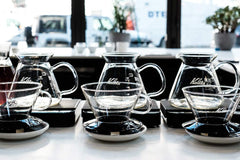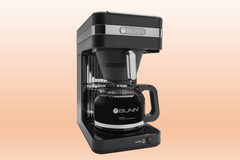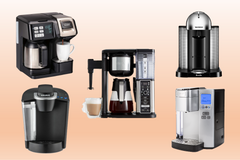If you've never heard the term 'waves of coffee', then don't worry you're not alone.
Waves of coffee is an important term that's worth knowing about when it comes to the coffee industry, brewing methods, and the coffee consumer. If you're a big lover of quality coffee and all things coffee-related, then it's definitely worth knowing about coffee terms like this one.
In this article, you'll get an understanding of what the waves of coffee are and what each wave means.
What are the waves of coffee?
The term 'wave of coffee' is a period of time or a particular stage that resides within the coffee industry.
While specialty coffee continues to evolve rapidly, there are three notable coffee waves in coffee history that we'll break down in more detail.
These waves represent the big changes and impact that the industry has had on the global coffee culture.
Coined by Trish Rothgeb in 2002, the three coffee movements are certainly worth knowing for coffee enthusiasts.
The three waves of coffee
To give a brief insight into the waves, each one poses a significant change that has evolved the coffee industry, two of which a lot of generations have already seen happen in their time.
1st Wave Coffee - In the 1800s, coffee became a commodity and as a result, coffee consumption started to grow more and more across the globe.
2nd Wave Coffee - In America, the giant coffee chain Starbucks began to change the coffee culture scene in the 1970s. Weirdly, it doesn't feel it's been around for as long as that but the first shop to open was in 1971 at Seattle's Pike Place Market.
3rd Wave Coffee - Coffee in the 2000s created another wave where it was purchased regularly based on its production origin and the roasting methods used to create it.
1st Wave Coffee

Coffee waves started back in the 1800s. Consumption of coffee wasn't as well-received as it is now but change happened in the 1800s when people noticed the potential behind coffee and therefore the approach to coffee changed.
A lot of people started purchasing coffee beverages regularly and this made way for coffee entrepreneurs who found that there was a big opportunity for growth in coffee sales.
Coffee though was seen as something that was pretty basic in its flavor. It wasn't something that we would have now as coffee drinkers back then were just looking for a caffeine kick.
Some of the important players in the coffee industry by this point were:
- Nescafé
- Mr. Coffee
- Maxwell House
- Folgers
The type of coffee available consisted of instant coffee mainly but there was also vacuum packaging used to retain the freshness of the coffee.
2nd Wave Coffee

The second wave and one that really changed the coffee industry was in the 1970s, with the introduction of Starbucks. This also made way for some of the other coffee chains we see across the world from Costa Coffee to Pret A Manager.
Around this period, Starbucks had already found a foothold in the industry, gaining more influence and dominance over the market. The palettes of coffee drinkers were becoming more refined and coffee consumption evolved beyond "bad coffee" and was now more about the flavor and wanting better qualities of the coffee bean.
There was also a counter culture coffee evolving where more commuters were relying on a morning cup of coffee to get them up and ready to work.
The Starbucks barista provided a different coffee experience that simply wasn't in existence beforehand. It became a more social experience and a chance to meet with fellow coffee drinkers.
During the second wave, coffee houses and cafes started to appear further accelerating the coffee movement. The coffee sector transformed into one that was more relaxed, whilst still providing those busy customers with quick access to coffee on the go.
For any coffee drinker, the second wave coffee really changed the coffee scene as we now see it today. Key players during the second wave include:
- Starbucks
- George Howell
- Peet's Coffee & Tea
3rd Wave Coffee

The third wave coffee is the most recent of waves.
The third wave is described by Trish Rothgeb as a movement towards good coffee. It's more about the quality of coffee and an approach to specialty coffee drinks, with more focus on the origins of the coffee.
Like the wine industry, there are more interests in how a cup of coffee can suit the tastes of the individual person. The availability of coffee is now more accessible than ever before and there are lots of varieties to choose from.
Coffee education is one that more coffee drinkers are embracing. Having extensive coffee knowledge is just like being the coffee version of a wine connoisseur. From the coffee blends to independent coffee roasters, there's now so much more to explore in this industry.
The experience of coffee has also evolved, with coffee companies opening up unique experiences that go further than simply drinking the coffee you're given. Baristas are also now being recognized more for their knowledge, than simply serving coffee. This knowledge is typically available everywhere but some coffee shops may have employees that are more knowledgeable in coffee than others.
Third wave coffee has also brought a focus on the industry's approach to sustainability on the supply chain as a whole from the coffee farmers to the roaster. As a result, many consumers are more conscious of the implications of fair trade and single origin coffee.
That's why a lot of coffee providers are being more careful about how they produce their coffee, as well as how they serve it.
The influential figures and companies for third wave coffee are Trish Rothgeb who coined the waves of the coffee term. There's also Specialty Coffee association, Stumptown Roasters, and Intelligentsia.
Are there more waves of coffee?
Although Trish Rothgeb only mentions three of the waves, some coffee experts would say that there are more waves worth highlighting.
4th Wave Coffee
The fourth wave is one that's described as being the science behind coffee. Consumers are interested in the detail and how to achieve the perfect taste experience.
5th Wave Coffee
The 5th wave, although not as well informed as the first three waves, reflects a new era that connects boutique hospitality and how coffee can be delivered through this industry.
6th Wave Coffee
The 6th wave and the last of the waves so far relate to the specialty coffee marketplace. It's about roasters across the world, sharing their products both nationally and internationally.
Coffee lovers are finding it easier to get their hands on beans produced by small roasters and not just large coffee corporations.
Coffee has a rich history that needs celebrating
If you've learned anything from this article, it's that coffee has a rich history that's worth embracing as you start to explore more coffee.
This humble beverage is a lot more important than you first thought and we are likely to see more growth in the coffee industry going forward.






